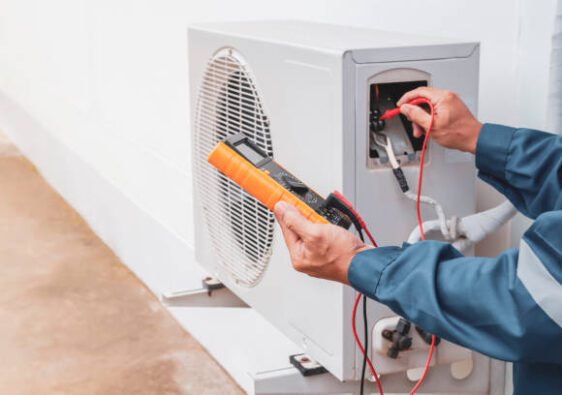Key Takeaways:
- Understanding the fundamentals of home cooling efficiency leads to better energy consumption and savings.
- Quick and practical tips can result in immediate improvement in home energy efficiency.
- Investing in the latest air conditioning technology can provide long-term financial and environmental benefits.
- Scheduled maintenance is essential for the longevity and performance of cooling systems.
- Cost-to-benefit analysis can guide decisions on upgrading air conditioning units.
- Understanding energy bills is pivotal in managing and reducing monthly expenses.
Table of Contents:
- Essentials of Home Cooling Efficiency
- Easy Tips for Immediate Energy Savings
- Advanced Cooling Technologies
- Maintaining Your Cooling System for Peak Performance
- Time for an Upgrade? Considering the Cost-to-Benefit Ratio
- Understanding Your Energy Bill
- Final Thoughts on Keeping Your Cool While Being Energy-Conscious
Essentials of Home Cooling Efficiency
The foundation of an efficient home cooling strategy is a comprehensive understanding of how different factors interact to affect climate control. First, consider the shell of your home: high-quality insulation is the unsung hero that keeps harsh temperatures at bay, acting as a barrier against heat during summer. Properly installed insulation can reduce the need for constant air conditioning, which preserves energy and cuts costs. Smart thermostat settings also play a pivotal role. For example, programmable thermostats can adjust temperatures based on your daily schedule, ensuring your home is cool when needed while conserving energy when it’s empty. Add the cost-effective benefits of using ceiling fans, which can make a room feel up to four degrees cooler by creating a draft, and your energy bills will reflect the difference.
Easy Tips for Immediate Energy Savings
Immediate energy savings are as simple as sealing and insulating your home correctly. Weatherstripping and caulking around windows and doors will keep the cool air where it belongs—inside. Additionally, window treatments like blackout curtains or reflective blinds can keep your rooms cooler by blocking out sun rays. Simple adjustments to your daily habits can also play a significant role. Avoid using heat-generating appliances such as ovens and dryers during the hottest parts of the day; save these activities for the evening when temperatures drop, reducing the load on your AC unit. Though these small steps may seem inconsequential, they can add up to a noticeable decrease in your energy bill and environmental footprint. For further insight into energy-efficient climate control, consider browsing through insights from top Air Conditioning service providers who often share tips on their websites.
Advanced Cooling Technologies
Technological advancements have revolutionized how we cool our homes, creating opportunities for substantial energy savings. Smart thermostats take the guesswork out of temperature regulation. They can learn your habits over time and adjust the cooling schedule for optimum efficiency or be controlled remotely via your smartphone, ensuring you never cool an empty house. Another leap forward is inverter technology in AC Commercial air Conditioning, which allows the compressors to operate at varying speeds, providing precise climate control and using energy more efficiently than traditional units’ on/off cycling. By investing in such advanced systems, homeowners can reduce energy consumption and embrace a more sustainable lifestyle.
Time for an Upgrade? Considering the Cost-to-Benefit Ratio
There comes a time when you must decide whether to continue spending on repairs or to invest in a new air conditioning system. Modern AC units are significantly more energy-efficient, and while they come with a higher initial price tag, they also promise considerable long-term savings on energy bills. To make an informed decision, homeowners should investigate Energy Star ratings, understand the average lifespan of cooling units, and weigh the upfront costs against potential savings. Resources such as Consumer Reports provide detailed analyses and comparisons that can help clarify the financial benefits of upgrading to a more efficient model.
Understanding Your Energy Bill
Understanding the specifics of your energy bill is essential for effective energy management. Your bill details the energy you consumed during the billing period and provides insights that can help make adjustments to reduce costs. Learning to interpret your bill can reveal trends in your usage patterns and even identify inefficiencies in your home. For many, this awareness leads to more conscientious energy consumption and fuels the motivation for continued efficiency improvements. By monitoring consumption and making informed choices, you can take further control of your home’s energy footprint and your monthly expenses.
Maintaining Your Cooling System for Peak Performance
Routine maintenance is crucial for keeping your cooling system at peak performance. Simple actions such as regularly replacing air filters can prevent dust and dirt from impairing efficiency. However, more intricate parts of an AC system require professional attention. For this reason, seasoned homeowners schedule annual AC servicing to ensure all components are in working order and to troubleshoot any potential issues before they escalate into costly repairs. Engaging with skilled technicians can also provide peace of mind and safeguard the longevity of your air conditioning investment.
Final Thoughts on Keeping Your Cool While Being Energy-Conscious
Embracing an energy-conscious approach to cooling your home doesn’t mean sacrificing comfort. It means taking a proactive stance—understanding the mechanics of your home, investing in technology upgrades judiciously, and keeping maintenance a priority. By integrating these strategies, homeowners can achieve a comfortable living environment while minimizing their energy consumption and positively impacting their wallet and the environment. With ever-rising energy costs and a growing awareness of our carbon footprint, now is the perfect time to adopt energy-efficient cooling practices that benefit your home and the planet.



